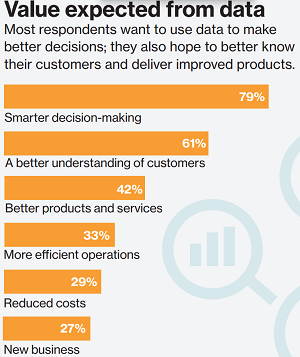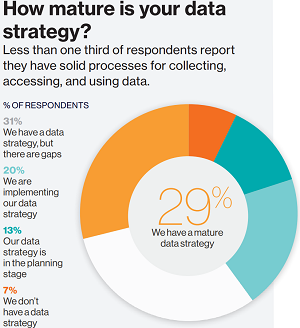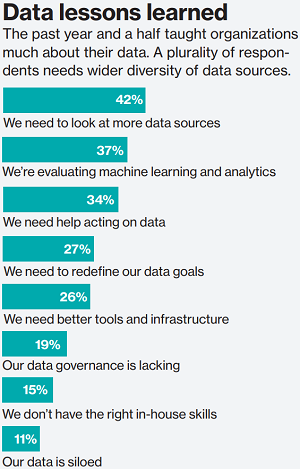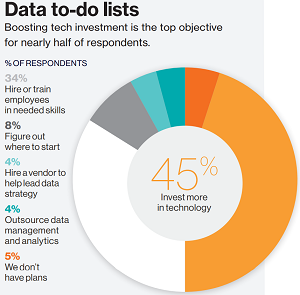News
Execs See AI, Cloud Analytics Driving Smarter Decisions
Developing a long-term data strategy is critical for organizations to thrive in a post-pandemic world, a new report says.
The executive briefing paper, published with a headline of "In unpredictable times, a data strategy is key," was sponsored by Amazon Web Services and published by the editorially independent MIT Technology Review Insights. The main takeaway is that processes to store, organize, access and act on vast amounts of data can be complex, but they're crucial to guide decisions that drive business growth.
"More than 18 months after the 2020 coronavirus pandemic struck, it's clear that the ability to make quick decisions based on high-quality data has become essential for business success," says an Oct. 16 post describing the report.
Specifically, technologies like artificial intelligence (AI) and cloud-based analytics help organizations store, process, analyze and put a treasure trove of accumulated data to use to boost business outcomes.
In fact, "smarter decision-making" was the No. 1 answer of survey respondents who were asked what value they expect from data, reported by 79 percent of respondents. Other expectations were a better understanding of customers, better products and services, more efficient operations and reduced costs.
 [Click on image for larger view.] Value Expected from Data (source: MIT Technology Review Insights).
[Click on image for larger view.] Value Expected from Data (source: MIT Technology Review Insights).
The survey, conducted in June/July 2021, polled 357 senior business leaders and academics, 54 percent of whom were C-level executives or directors from Asia-Pacific, Europe and North America, with the largest response group being IT/telecommunications. Along with survey data, the report is based on in-depth executive interviews. In regard to the claim of editorial independence, the report doesn't mention AWS products or even the company itself except for an executive's quotes and references in a note from the sponsor at the end.
"Companies also learned valuable lessons about the importance of data as they struggled to stay competitive during the pandemic," MIT Technology Review Insights said. "Roughly four out of 10 survey respondents, for example, report that they need to look at more sources of data, including demographic, geospatial, and competitor information. More than a third (37 percent) are evaluating machine learning and analytics -- technologies essential to extract critical insights from their data. And 34 percent need help acting on the vast sums of data they gather and process."
All of the above serves to back up what the report says are its three main takeaways:
- Organizations of all sizes and across industries know they need to be data-driven to thrive in the competitive digital economy that's emerging from the 2020 coronavirus pandemic.
- Technologies such as cloud computing, analytics, and artificial intelligence are fueling efforts to get more value from data, with smarter decision-making the highest-ranking expected benefit.
- Despite their acknowledgment of the power of data to transform business, most organizations are lagging when it comes to enacting a data strategy -- a comprehensive plan to manage, access, analyze, and act on data.
Regarding that last item about enactment lag, the report says, "Only 29 percent of respondents say they have a mature data strategy -- solid processes for collecting and accessing data and using data, analytics, and machine learning to make smarter decisions and improve internal processes. Nearly one third of respondents (31 percent) say they have a data strategy, but execution gaps prevent them from getting the most value out of data."
 [Click on image for larger view.] How Mature Is Your Data Strategy? (source: MIT Technology Review Insights).
[Click on image for larger view.] How Mature Is Your Data Strategy? (source: MIT Technology Review Insights).
The survey also asked respondents about data lessons learned, with the top answer being "We need to look at more data sources," reported by 42 percent. Way down the list is "We don't have the right in-house skills," which contradicts many surveys covered by Virtualization & Cloud Review, where lack of in-house skills is commonly reported as a top challenge whether the topic be containers, Kubernetes, multi-cloud, DevOps, distributed computing, SDN/NFV and more.
 [Click on image for larger view.] Data Lessons Learned (source: MIT Technology Review Insights).
[Click on image for larger view.] Data Lessons Learned (source: MIT Technology Review Insights).
However, the skills problem resurfaces in another survey question in which respondents were asked about their data to-do lists. Here, the top to-do item -- reported by 34 percent of respondents -- was "Hire or train employees in needed skills." The report didn't comment on those apparently contradictory findings.
 [Click on image for larger view.] Data To-Do Lists (source: MIT Technology Review Insights).
[Click on image for larger view.] Data To-Do Lists (source: MIT Technology Review Insights).
"In an increasingly competitive and constantly shifting landscape, companies must be agile enough to tackle persistent challenges, ranging from cost-cutting and supply chain issues to product development and market shifts," the report said. "Critical to thriving post-pandemic, say technology leaders and experts, is developing a long-term data strategy. That provides a strong foundation and clear vision which supports the organization's ability to manage, access, analyze, and act on its data at scale to guide strategic business decisions."
About the Author
David Ramel is an editor and writer at Converge 360.